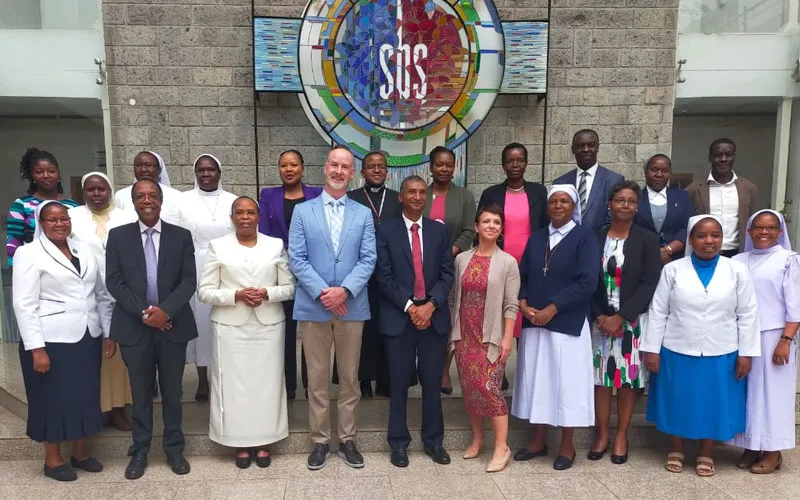“Sisters are also into agriculture and most of them grow the food that they consume in their communities. In many local communities, Sisters are looked at as leaders,” the member of the Sisters of St. Joseph of Mombasa said.
She expressed regret that despite the multiplicity of roles in apostolates that Catholic Sisters are involved in, most of their services and products are offered on a charity basis and that they do not gain anything from what they offer.
Many of the Catholic Nuns engage in apostolates without adequate practical and technical skills, she said, and added, “The SBVP seeks to change this; to transform these ministries of Sisters into sustainable social enterprises and multiply the impact of these ministries, thus push for the economic development and more social impact in the society where the Sisters operate.”
The Kenyan Catholic Nun who has a background in Journalism and Media Studies as well as in Interreligious Dialogue and Islamic Studies expressed confidence that through the SBVP program, “Sisters will be on the forefront of tackling head-on, the scourge of poverty and to contribute on various Sustainable Development Goals.”
“I want to believe and to dream that one day, in a few or many years to come, our society, and in extension, the global community will be a better place because of this Sisters’ program,” Sr. Bridgita said.
(Story continues below)
She added, in reference to those behind the program, “We appreciate the fact that the Hilton Foundation saw the need to have a local partner that understands the contextual environment within which ACWECA operates and offered support for the same. We appreciate the trust shown to us and for the partners including Strathmore Business School.”
She explained that ACWECA coordinates the apostolates of over 30,000 Sisters from over 350 Congregations in 10 English-speaking countries of the Eastern and Central Africa. The countries include, Kenya, Eritrea, Ethiopia, Sudan, South Sudan, Uganda, Tanzania, Malawi, Zambia and Zimbabwe.
In her address at the April 27 launch, Sr. Jane Wakahiu who provides leadership and direction of the Hilton Foundation Programs maintained that things have changed and that Congregations in Africa no longer get the amount of funds they used to receive from Western countries.
Sr. Wakahiu explained that when missionaries were still establishing bases in Africa, most of them would go back to their countries every summer where they conducted mission appeals. And on coming back, they would use those funds to establish institutions.
“We know that the number of Consecrated persons in the western world is declining. Even we who are here in Africa do not have stations in the western world where we can go and do mission appeals for funds. We have to think differently in terms of sustaining our ministries,” the member of the Little Sisters of St. Francis in Kenya said.
She said that Sisters work with the poor people, always plowing what they get back into their ministries, and added, “With such a model, those ministries cannot be sustainable and the Sisters cannot be able to support themselves.”
Sr. Wakahiu who also oversees the planning, development, implementation and evaluation of the Catholic Sisters initiative underscored the need for partnerships in the mentorship of Catholic Sisters, saying, “At the Hilton foundation, we may be having resources through our founding father, Conrad Hilton. But those resources may not have meaning, if we do not have partners like you.”
Challenging Sisters in Africa to nurture a business mindset, the author and contributing writer of the Global Sisters Report (GSR) said, “Charity is good; it is the supreme law of love. But if we have to do charity, there is a need to sustain ourselves and even plan for the future.”
The Kenyan Catholic Nun who contributes to Hilton Foundation’s strategic planning noted that the program is a pilot, which will be stepped up once it is seen to be flourishing.
Conrad N. Hilton Foundation president of strategy and programs, Marc Holley, explained that the 75-year-old entity, which started as a business enterprise of hotels around the world, aims to bring about social transformation.
Mr. Holley explained that the Catholic Sisters’ program is the largest project that the Conrad N. Hilton Foundation works with, followed by a program with refugees, and the global early childhood development program, among others.
“Our programs are local because it is local people who are most likely to have insights into their solutions. This is what these Sisters do on a daily basis and I have deep respect for your commitment to your respective communities,” Mr. Holley said.
On her part, the Acting Executive Dean at SBS, Dr. Angela Ndunge, highlighted planned activities of the SBVP, and said that experiences of the Sisters involved in the program will be documented in journal papers and cases.
Dr. Ndunge explained that the first cohort of the SBVP social enterprise program targets Catholic Sisters who are starting up. These include Sisters who have projects that are about six months to three years old and are still struggling to firm them up.
The second phase will include Catholic Sisters who have been running enterprises for more than three years and are struggling to stabilize and to scale up, the Strathmore University don said.
This, Dr. Ndunge said, will be followed by a higher level that will engage enterprises that have existed for a longer time and have stabilized but are still looking to put up proper governance structures to ensure that the enterprises are sustainable.
Agnes Aineah is a Kenyan journalist with a background in digital and newspaper reporting. She holds a Master of Arts in Digital Journalism from the Aga Khan University, Graduate School of Media and Communications and a Bachelor's Degree in Linguistics, Media and Communications from Kenya's Moi University. Agnes currently serves as a journalist for ACI Africa.








